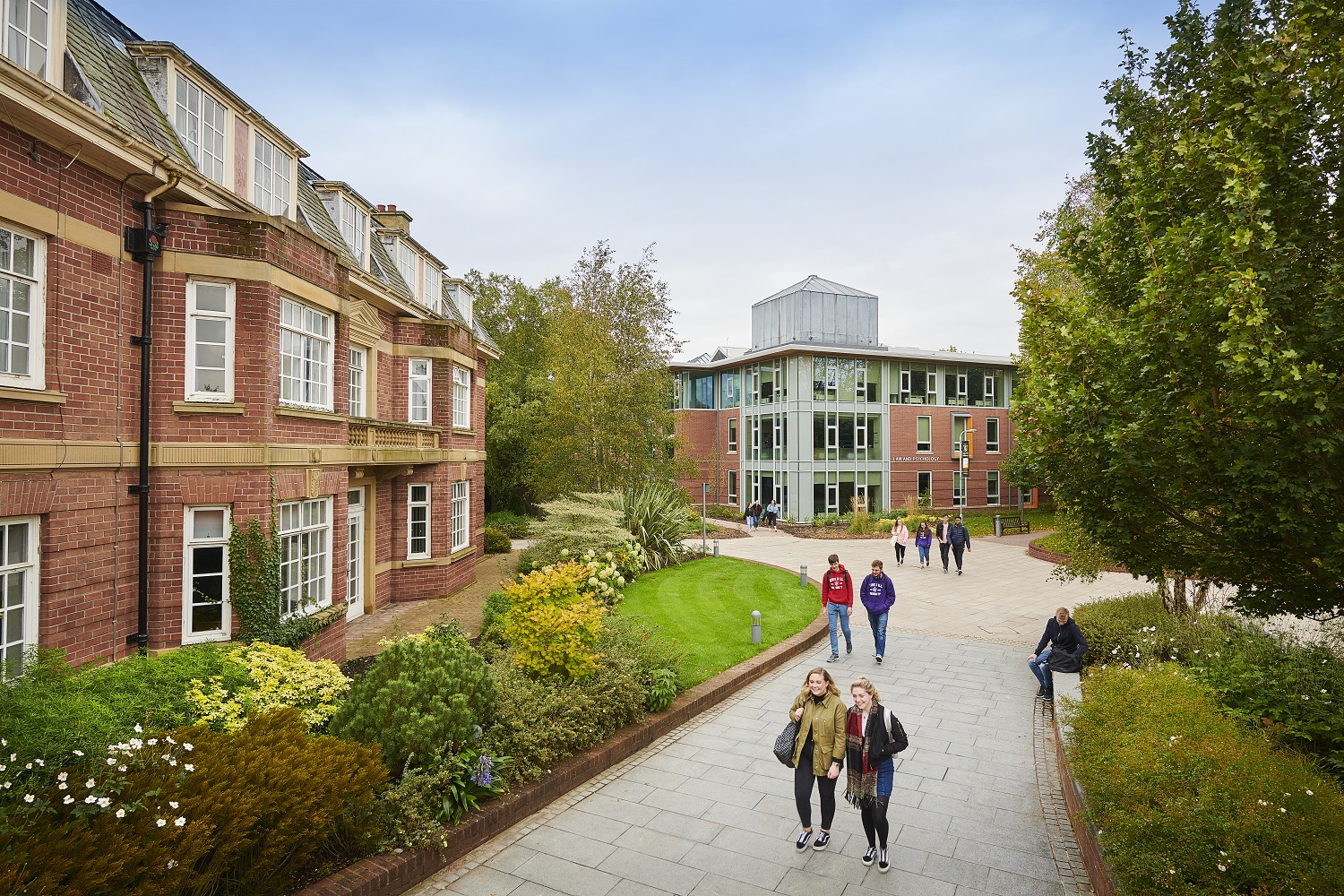Criminal Justice and Psychology BSc (Hons)
UCAS code: CP54
Eager to learn about crime, criminals and criminal justice? Do you want to learn about the fundamental principles of psychology? Our criminal justice and psychology degree combines both subjects in a lively and engaging fashion.
Overview
| Course length: | 3 years full-time |
|---|---|
| Start dates: | September 2026 |
| Location: | Edge Hill University |
| Example offers: | BCC-BBC (A Level) 104-112 UCAS Tariff points View full entry criteria |
| Subject(s): | Policing and Criminal Justice |
| Faculty: | Arts and Sciences |
| Department: | Law and Criminal Justice |

What are the role and functions of the criminal justice system in contemporary societies? Ready to untangle the complexities of criminal behaviour? By combining the study of criminal justice and psychology, you’ll explore contrasting and complementary perspectives of these two subjects.
We’ve designed this course to allow you some freedom of choice when it comes to choosing your modules – so you’ll be able to explore topics that complement one another. For example, you might examine forensic psychology to understand what motivates people to carry out criminal behaviour in psychology, alongside exploration of how factors such as ethnicity, gender or class impact on the way in which individuals and communities experience the criminal justice system.
At our School, we pride ourselves on providing not only an excellent academic experience but also a supportive environment where you can thrive. We offer a broad range of extra-curricular activities to enhance your university experience, which includes Professional Mentoring opportunities, Careers Fairs, Insight Days, Guest Speaker Events and resilience programmes.
Course features
-
International students can apply
-
Sandwich year option available
-
Studying abroad option available
What you'll study
In your first year of your criminal justice and psychology degree, we’ll introduce you to the key concepts and principles of criminal justice and psychology. You’ll study various causes and explanations of crime, the criminal justice process, applied psychology and various elements of behavioural psychology. This will give you a solid grounding for your next two years of study.
In your second year, you’ll start to get a much deeper understanding of criminal justice and psychology. You’ll choose three modules from a range of options. You might choose to focus on gender and violence, cyber crime, or various aspects of psychology.
Your final year gives you the chance to specialise in an area of particular interest. You might choose to look into the actions of the police in more detail, or cyber risk and security. Perhaps you’ll be interested in exploring the expanding field of forensic psychology. You’ll also have the opportunity to complete a dissertation that will combine insights from both disciplines.
Please note, the 60 credits of optional modules must include at least one of CRI3025; CRI3109; LAC300 and at least one of PSY3150; PSY3139 and PSY3140.
How you'll study
The programme is delivered through a combination of lectures, tutorials, student-led seminars, small group work, practical workshops, directed study (preparing for classes) and independent study.
How you'll be assessed
Assessment methods include essays, formal examinations, statistical exercises, group research projects, report writing, oral presentations, designing a research proposal and completing a dissertation.
Who will be teaching you
You will be taught by a highly-committed team of research-active, expert tutors whose primary areas of specialism correspond directly with the themes of the modules available across this programme.
Where your course includes optional modules, these are to provide an element of choice within the course curriculum. The availability of optional modules may vary from year to year and will be subject to minimum student numbers being achieved. This means that the availability of specific optional modules cannot be guaranteed. Optional module selection may also be affected by timetabling requirements. Some restrictions on optional module choice or combinations of optional modules may apply.
Entry criteria
Typical offer 104-112 UCAS Tariff points, for which no specific subjects are required.
Example offers
| Qualification | Requirement |
|---|---|
| A Level | BCC-BBC. |
| UCAS Tariff points | 104-112 points. |
| BTEC Extended Diploma (or combination of BTEC QCF qualifications) | Distinction, Merit, Merit (DMM). |
| T Level | Overall grade of Merit. |
| International Baccalaureate (IB) | We are happy to accept IB qualifications which achieve the required number of UCAS Tariff points. |
| Access to Higher Education Diploma | 45 credits at Level 3, for example 9 credits at Distinction and 36 credits at Merit or 15 credits at Distinction and 30 credits at Merit. The required total can be attained from various credit combinations. |
Please note, the above examples may differ from actual offers made. A combination of A Level and BTEC awards may also be accepted.
If you have a minimum of two A Levels (or equivalent), there is no maximum number of qualifications that we will accept UCAS points from. This includes additional qualifications such as Extended Project Qualification (EPQ), AS Levels that haven't been continued to A Level, and General Studies AS or A Level awards.
English language requirements
International students require IELTS 6.0, with a score no lower than 5.5 in each individual component, or an equivalent English language qualification.
Fair Entry Criteria
Our new Fair Entry Criteria is a Contextual Admissions Policy that takes an applicant’s personal and educational background into account. This policy will allow eligible applicants to receive up to a two-grade reduction in their entry requirements for this course. Find out more and see if you qualify.
How to apply
Apply full-time
Read our guide to applying through UCAS to find out more about the application process.
International
Please see our international student pages for further information about how to apply as a prospective international student.
Should you accept an offer of a place to study with us and formally enrol as a student, you will be subject to the provisions of the regulations, rules, codes, conditions and policies which apply to our students. These are available at www.edgehill.ac.uk/studentterms.
If you join a full time undergraduate degree at Edge Hill University, we will guarantee you the offer of a room in our halls of residence for the first year of your course.
Discover our accommodation
Facilities
The £6m Law and Psychology building provides contemporary teaching and learning facilities for students in the School of Law and Criminal Justice.
The three-storey building includes a 250-seat lecture theatre, seminar and tutorial rooms, and social learning areas which encourage a more informal and interactive style of learning.
It is also where our moot court room and law clinic are located. Law, Policing and Criminal Justice students can train and practice their advocacy skills and cross-examination techniques as well as preparing for giving evidence in court.
Our Police Training and Simulation Facility known as the ‘Crime House’, part of which is furbished as a police station, is used to simulate a wide range of crime scenes, providing students with an immersive learning experience. The ‘Crime House’ includes a mock custody suite, mock living areas, interview rooms, a control room, and a state-of-the-art simulation suite.
This enables Policing, Criminal Justice and Law students to work together on practical exercises, developed by our expert staff and based on real-life scenarios, in areas such as gathering and analysing evidence, (including forensic evidence at crime scenes), practicing interview techniques and supporting mock clients during a police interview.
Finance
Tuition fees
UK Full-Time
£9,790
a year
International
£18,000
a year
EU/EEA and Swiss students who have settled or pre-settled status under the EU Settlement Scheme, as well as Irish nationals, may be eligible for the UK tuition fee rate.
Financial support
Subject to eligibility, UK students joining this course can apply for a Tuition Fee Loan from the Government to cover the full cost of tuition fees. UK students enrolling on the course may also be eligible to apply for additional funding to help with living costs.
Scholarships
We offer a range of scholarships, which celebrate the determination, commitment and achievement of our students. Many of our scholarships are awarded automatically. There are some however, where you will need to be involved in an application or nomination process. To find out more about our scholarships and check your eligibility, please visit our dedicated scholarships pages.
Money Matters
Please view the relevant Money Matters guide for comprehensive information about the financial support available to eligible UK students.
EU/EEA and Swiss students who have settled or pre-settled status under the EU Settlement Scheme may be eligible to apply for financial support. Irish nationals can ordinarily apply to Student Universal Support Ireland (SUSI). If you are an EU student who does not have settled or pre-settled status, or are an international student from a non-EU country, please see our international student finance pages.
Tuition fees
UK Full-Time
£9,535
a year
UK Part-Time
£79 per credit
for 360 credits
International
£17,000
a year
EU/EEA and Swiss students who have settled or pre-settled status under the EU Settlement Scheme, as well as Irish nationals, may be eligible for the UK tuition fee rate.
Your future career
By the time you achieve your criminal justice and psychology degree, you’ll have a wide range of transferable skills that will equip you for a graduate role or further study.
Our graduates go on to have exciting careers in the police, HM prison service and the Home Office, as well as in these areas:
- criminal or youth justice agencies
- youth and community work
- law and research
- offender management
- social work
- outreach
Other students continue on to postgraduate study, or train to become teachers or chartered psychologists.
One option is to continue your studies on a postgraduate conversion course in psychology. This would enable you to pursue a career where successful completion of a higher education programme accredited by the British Psychological Society is required.
Course changes
Every effort has been made to ensure the accuracy of this information, however our courses are subject to ongoing review and development. Changing circumstances may necessitate alteration to, or the cancellation of, courses.
Changes may be necessary to comply with the requirements of professional bodies, revisions to subject benchmarks statements, to keep courses updated and contemporary, or as a result of student feedback. We reserve the right to make variations if we consider such action to be necessary or in the best interests of students.












